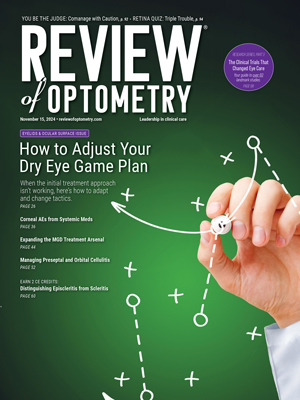 |
| The FTC recently proposed changes to the Eyeglass Rule that would require ODs to provide patients with a copy of their prescription after an eye exam, as well as obtain a signature from the patient confirming that they received it. Photo: Getty Images. |
Back in December, the Federal Trade Commission (FTC) proposed a list of changes to its Eyeglass Release Rule in response to several hundred public comments regarding prescription distribution to patients following eye exams. The proposed measures would require ODs and MDs to obtain a signature from all patients who undergo an eye exam including refraction to confirm that they received a physical or digital copy of their prescription. In exchange, patients wouldn’t be required to purchase glasses or contacts from the prescriber. Additionally, doctors would have to keep these files on record for at least three years.
For the last couple of months since the announcement, the Commission was accepting feedback from the public on the proposed measures. The American Optometric Association (AOA)—representing more than 48,000 optometrists in the United States—recently came forward to voice its perspective on how the changes could adversely affect optometry practices, the majority of which are small businesses.
“Doctors of optometry practices often do not have large teams of staff members,” noted the AOA in a letter addressed to the FTC on March 6th. “Across the country, 91.9% of optometry practices have fewer than 25 employees. We understand that the FTC may view an additional form or documentation requirement to be a small update to the rule, but staffing challenges in medical practices cause serious issues that should not be dismissed lightly,” the AOA remarked, citing a recent study that found that staffing shortages led to increased medical errors for 34% of doctors worldwide. “We urge the FTC to carefully consider whether there is a real urgency at this moment to implement a new requirement of thousands of small businesses across the country.” The AOA pointed out that fewer than 50 prescribers across the country have been warned about noncompliance with the current prescription release requirement.
Other revisions to the Eyeglass Rule recommended by the AOA would serve to better protect consumers by cautioning them against the potential implications of using online retailers to fill vision prescriptions, a trend that has increased in recent years. “In 2020, more than 44% of adults who purchased eyeglasses used the internet to assist in their acquisition of prescription eyeglasses, up from 22% in 2017,” the AOA stated in the letter. Because these online distributors don’t provide the same level of care to patients as is provided by in-person eyecare providers, the AOA suggested that the FTC consider including the following advisory to consumers in the rule:
- “The online retailer cannot guarantee that the eyeglasses you have purchased will meet your visual needs. The retailer will develop eyeglasses based on the prescription provided. However, errors can occur, and the company is not required to assess whether the eyeglasses have met your visual needs following purchase.”
- “If your eyeglasses do not fit well upon receipt, the online retailer is not required to adjust your eyeglasses in person. You will typically be provided with instructions on how best to self-adjust your eyeglasses to address your concerns. Some recommendations may include bending the eyeglasses yourself or adjusting how you hold your head when using the glasses.”
- “The online retailer is not obligated to respond to any complaints or issues surrounding your purchase.”
To emphasize the necessity of these changes, the AOA informed the FTC that “notifying consumers of these realities in advance of purchase is especially urgent given that wearing glasses with the improper correction or fit can lead to additional health concerns such as dizziness and nausea. Currently, online retailers have no real obligation to ensure that the glasses purchased fit or address the patient’s visual needs, and this should be made clear.”
Another Eyeglass Rule update that the FTC has proposed is to replace the term ‘‘eye examination’’ with ‘‘refractive eye examination,” which the AOA argued may cause further confusion for consumers. “A refraction may include objective and subjective assessment of the patient’s refractive status; however, the results of a refraction do not provide all the information needed to determine an optical prescription,” the association explained in its letter. “The refractive error measured should be analyzed with other testing data, and an assessment of the patient’s visual needs obtained during an in-person examination.” As an alternative to updating the rule’s current language, the AOA recommended that the FTC “defer to the AOA’s definition of the comprehensive eye examination as outlined in the Comprehensive Adult Eye and Vision Examination Clinical Practice Guideline.”
The AOA described several other amendments to the rule for the FTC to consider, while also expressing its concurrence with some aspects of the Commission’s original proposal. For example, the AOA noted that it “agree[s] with the FTC that there is currently no reason to require that prescribers include pupillary distance on the eyeglass prescription.” Additionally, in the next portion of the letter, the AOA wrote that it “believes that the FTC’s decision not to set expiration dates for eyeglass prescriptions is appropriate.”
In a recent article on the AOA’s website explaining its recommended updates to the Eyeglass Rule, the association lists three ways that optometrists can “help ensure that illegal contact lens sellers are held accountable and adverse patient outcomes are reported:
- Report a website illegally selling contact lenses.
- Report an adverse event related to contact lenses.
- Email a de-identified case report to [email protected] to help bolster AOA advocacy against harmful contact lens practices. Include the state where you practice in your email.”
The AOA stated in the article that it will be “requesting meetings with the FTC to discuss the proposed rulemaking prior to the FTC issuing a final rule.”
American Optometric Association. AOA makes robust rebuttal to FTC over proposed changes to Eyeglass Rule. Published on March 16, 2023. www.aoa.org/news/advocacy/federal-advocacy/aoa-makes-robust-rebuttal-to-ftc-over-proposed-changes-to-eyeglass-rule?sso=y. Accessed on March 20, 2023. |

